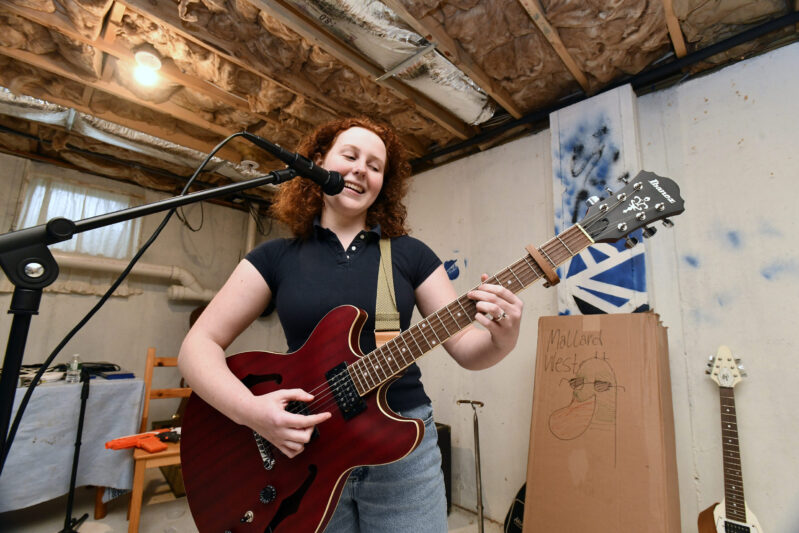
The start of Allison Rishel’s freshman year at Southampton High School was the best of her young life.
She was coming into her own as a track star — “I was super fast on the cross country team, I got all these medals,” she recently recalled from her home in Water Mill — and she had not one but two birthday parties on the horizon, in order to accommodate her huge group of friends, who all wanted to celebrate her turning 15 on March 18, 2020.
“And then,” she said, “on March 15, everything just stopped.”
The following day — when her school shuttered its doors due to the COVID-19 outbreak — Allison’s life unraveled and changed forever. She lost her spark to run. The majority of her friends disappeared.
And behaviors that had hinted at a mental illness crescendoed, she said, to the point where she couldn’t push them aside any longer.
So, she went to see her doctor — and, at home, she picked up her guitar.
In her basement, the highs and lows poured out of her, which she would soon be able to identify as bipolar disorder. And while, with her music, she aims to destigmatize mental illness, this is a diagnosis that she refuses to let define her.
“I was just very relieved, like, ‘Wow, okay, now I have a title,’” the now 17-year-old junior said of bipolar disorder. “It’s kind of like discovering a part of yourself.”
She paused. “It’s just a part of you,” she continued. “And it doesn’t matter what people think about it because it’s just a part of you.”
Growing up in a musical family, Allison remembers wanting to grow up to be a drummer. “Nothing happened with it — that was in kindergarten,” she said with a laugh. She started teaching herself how to play ukulele and guitar in middle school.
“I tried making music just for fun, and it was very embarrassing,” she said. “During quarantine, my freshman year, I was, like, ‘Wait, this is actually kinda fun!’ So I made a song that was personal to me about my experiences with stuff. That’s how it happened.”
Under the name “Mallard Westcott,” Allison produced her first self-titled album earlier this year — its 15 songs, in part, a representation of her manic and depressive episodes, and an effort to help listeners like her feel less alone.
“I was undiagnosed with mental illness back then, and so I was dealing with all these emotions and behaviors, and I had no idea what was going on,” she said. “So this first album is really an exploration of this. I was writing about that before I even knew what it was.”
The album starts with “New Haircut,” which is about the impulsivity and recklessness that comes with mania, she said. “There’s a Man Outside” explores the paranoia and unease that came with “being undiagnosed, but knowing something is ‘up.’”
“‘The Sorry Biz’ is about being a ‘flake’ — having to cancel plans and feeling guilty because of it all, even on days to better your mental health,” she said. “‘So (On + Forth)’ is about, simultaneously, isolating yourself and being isolated by friends, and being upset about both.”
For the self-taught producer, her next full album is only a matter of time — she has 188 songs recorded on her phone already, she said — though her music feels more abstract now, she said.
“I feel like I’ve said a lot of what I needed to say,” she said regarding her mental health. “I’ve gotten way better. I like to think I’ve gotten a lot better. It’s taken on many different forms, just like anything else in life. I’m just feeling it out, riding it out, so we’ll see what happens with it — because right now, it’s pretty uneventful, which is really good.”
After graduation next year, Allison said she eventually wants to pursue a career as a music therapist, after seeing the impact music has had on people close to her, as well as herself.
“I always knew that music is something I really enjoy and, now that I got that diagnosis, it’s like therapy,” she said. “I want to help other people deal with their stuff, too.”
In school, Allison’s teachers often describe her as “creative,” she said, and to her, that is ultimately what music is about — an outlet for her to express her truest self and the journey she’s been on.
“I’m looking at my guitar right now — this is the guitar I’ve had since freshman year,” she said. “In the years since, I’ve painted it, I’ve put stickers on and taken them off. It’s a transformation.
“Music itself is a transformation for me — always changing, never the same.”